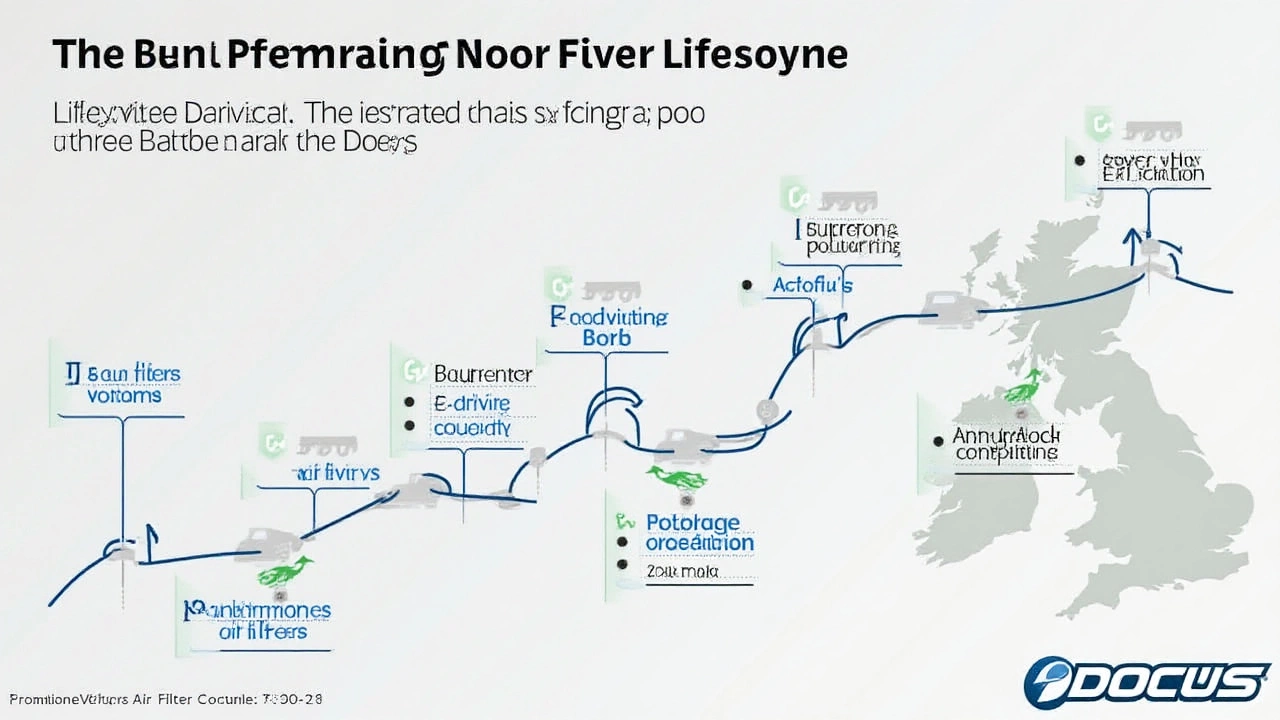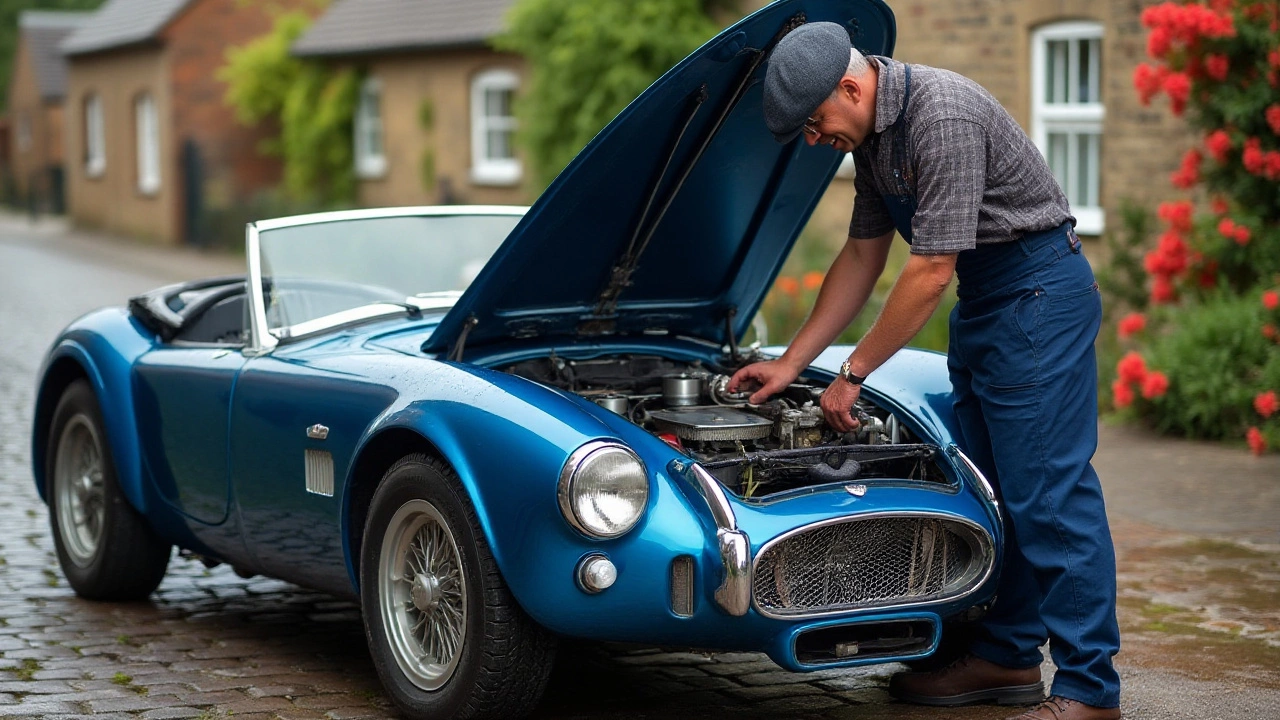For car enthusiasts and everyday drivers alike, performance air filters offer a breath of fresh air—literally. Their promise of enhanced airflow translating into more power and better fuel efficiency makes them a popular choice among vehicle upgrades. However, just like any component in your car, they come with a question mark hanging over their lifespan.
Understanding how long a performance air filter can last isn't just about numbers; it's about how you drive, where you drive, and how much attention you pay to the whispers of your engine. In this article, we’ll dig deep into what determines the longevity of these filters, ensuring you keep your vehicle running at peak performance, while also enjoying the ride.
- Introduction to Performance Air Filters
- Understanding Air Filter Lifespan
- Factors Affecting Filter Longevity
- Signs Your Filter Needs Replacement
- Tips for Maintaining Your Air Filter
- Environment and Usage Impact
Introduction to Performance Air Filters
In the intricate world of automotive engineering, performance air filters have carved out their niche as essential yet often underestimated components. Designed to replace the standard filters found in most vehicles, these specialized air filters are crafted with precision to allow more airflow into the engine. The concept behind performance air filters is simple yet profound: by letting more air into the engine, they enhance combustion, which can lead to a notable increase in horsepower and overall engine efficiency. This can make a significant difference, particularly in high-performance cars or those that are subjected to demanding conditions on the road or track.
What sets these filters apart is their construction and material. Unlike the paper materials used in conventional filters, performance filters often utilize cotton gauze or foam. These materials are pleated and coated with a special oil that helps trap even the smallest particles, preventing them from reaching the engine. Many manufacturers in the automotive industry, such as K&N and AEM, have championed this technology, offering filters that tout benefits like a 50% more airflow compared to standard filters. This greater airflow can improve fuel economy and reduce emissions, making performance filters a popular choice among environmentally conscious drivers as well.
For those wondering about the impact on their vehicle's health, automotive experts consistently highlight one crucial point. As automotive journalist John Davis aptly noted,
“The true value of a performance air filter lies not only in power gains but also in engine protection, something no driver can afford to overlook.”This emphasis on both performance and protection underscores why these filters are becoming a staple in regular maintenance routines. The longevity of these filters is another aspect that draws attention. While standard filters might need replacing every 15,000 miles or so, many performance air filters are washable and reusable, with some lasting up to 50,000 miles before needing significant maintenance. This not only saves money in the long run but also contributes to a reduction in waste, aligning with sustainable automotive practices.
In terms of installation, the process is often straightforward, designed to fit seamlessly into the slots where the standard filters reside. This DIY-friendly nature is another reason for their popularity; it empowers car owners to take an active role in their vehicle's performance enhancements without needing specialized mechanical expertise. Most manufacturers provide detailed instructions and even video tutorials to aid installation, making it a task that can be completed in minutes rather than hours.
Beyond functionality, performance air filters also cater to the aesthetic sensibilities of auto enthusiasts. Many are available in different colors or come with stylish branding, offering a subtle yet personalized touch under the hood. This blend of form and function speaks to the heart of why performance air filters matter: they offer a tangible improvement to the driving experience while respecting the personal touch each driver brings to their vehicle.
Understanding Air Filter Lifespan
When diving into the question of how long performance air filters last, several variables must be considered to sketch out an accurate picture. Typically, a high-quality performance air filter can last anywhere between 15,000 to 30,000 miles. However, certain performance filters are marketed as 'lifetime' filters, provided they're properly maintained by cleaning and re-oiling them at necessary intervals. The longevity of these filters shouldn't merely be measured in miles; driving conditions, maintenance habits, and even the type of roads a driver frequents play substantial roles in determining their lifespan.
Imagine your route comprises long stretches of open highways with little dust or debris; in such scenarios, a performance filter can serve you longer without needing attention. On the flip side, if you're primarily navigating urban environments, teeming with particulate matter from both vehicular emissions and construction dust, the filter’s capacity might diminish more rapidly. It adapts to its surroundings, much like how we adjust our habits based on our environment. Countless experiences where drivers noted having to clean their filters more frequently when driving in desert or rural backdrops illustrate this point.
The popular auto enthusiast site, Car Talk, mentions, "Pushing the limits of your air filter isn't unlike doing the same with your car's oil change—the risks often outweigh the rewards."
Maintenance forms the heart of what dictates the functionality and eventual lifespan of any filter. Drivers that adhere to manufacturers' cleaning cycles often find their mileage extended. Manufacturers usually suggest cleaning the filter every 25,000 miles or once annually, whichever comes first. However, diligent owners who keep an eye on unusual engine sounds or diminished fuel performance often fare better. They recognize these red flags as potential signs the air filter might have overstayed its welcome. Not sticking to such routines can not only eat into the filter’s longevity but end up compromising the vehicle’s engine health and reducing its fuel efficiency, spelling trouble in the long haul. As we delve deeper, remember that a filter lifespan isn't fixed; a concoction of responsible practices and environmental factors keeps it flexible, ensuring your car breathes easy for years on end.
Maintaining Performance Air Filters
Delving into the importance of maintenance brings us one step closer to optimizing the filter's lifespan. Opting for consistent maintenance is akin to caring for an old, prized possession. This often involves keeping a close eye on both its physical condition and its health, akin to visiting a doctor for timely checkups. Take note of any visible debris accumulation, the color of the filter material, a clear giveaway intending to signal care. Most performance filters are washable and reusable, a point not to be overlooked. Cleaning involves simple steps—washing with a gentle detergent, rinsing thoroughly, and drying completely before reinstalling. Follow this with proper re-oiling where applicable and the filter can go right back to its primal duty.
Consideration should also extend to the brand and type of filter. Brands like K&N and Spectre offer some of the most trusted high-performance options on the market, suggested frequently by auto experts. Remember, sometimes the longevity isn’t just influenced by how but also by where—where it was crafted, what material distinguishes it, and with what intention it was engineered to optimize a car's heartbeat. In essence, knowing how long your performance air filter lasts goes beyond miles; it mirrors the narrative of thoughtful care and timely adjustments, keeping your vehicle ready and ever-responsive to your directions.

Factors Affecting Filter Longevity
When it comes to determining how long a performance air filter will last, various factors intertwine to play significant roles. While manufacturers often provide estimates based on lab conditions, real-world usage can tell a different story. Environmental conditions are at the top of the list, with dust, humidity, and even pollution levels dictating how quickly a filter will need a change. Vehicles operating in urban areas filled with pollution may experience faster wear and tear compared to those driven in cleaner, rural areas. Humidity, in particular, can cause the paper element in some filters to degrade faster, making regular checks essential.
Next, on the factor list is your driving habits. Aggressive driving usually accelerates the wear of the filter because it demands more air intake, meaning the filter has to work harder and catch more debris. Long distance drivers, surprisingly, might replace their filters less frequently, given their travel on highways exposes the filter to less particulate pollution compared to city drives. It's interesting to note how driving behaviors, like sudden acceleration or engine revving, can have tangible effects on components one might reckon are unconnected from such actions. According to a 2020 study by Automotive Engineering Magazine, the average driver in dense urban areas needs to replace their air filters twice as often as those in rural environments.
Additionally, the type of car maintenance performed can certainly affect how long your filter stays in peak condition. A regular maintenance schedule that includes cleaning the filter according to the manufacturer's specifications can significantly extend its lifespan. Neglect, on the other hand, tends to pile up dirt and debris, reducing both its effectiveness and life expectancy. Spending a few minutes every couple of months to check your filter's condition can save you from early replacements and keep your engine running smoothly. The more care you invest in maintaining your air filter longevity, the better performance and cost-efficiency you will enjoy in the long run.
"A clean filter allows your engine to breathe better, significantly impacting fuel efficiency and performance," says John D. Miller of the National Automotive Research Institute, emphasizing the correlation between clean air intake and optimal engine performance.
Fascinatingly, different types of performance air filters also vary in longevity due to materials and construction. While cotton gauze filters might last longer due to their reusability after a good wash, paper filters are limited to a more finite life span, often needing replacements more frequently. Users must weigh their options considering the initial cost versus the long-term benefits. Additionally, it’s noteworthy mentioning that some modern air filters come with multi-layered designs that enhance filtration but might also clog faster under severe conditions. Understanding the specific requirements and limitations of your chosen filter type will help in making informed decisions about your vehicle's needs.
Signs Your Filter Needs Replacement
Recognizing when your performance air filter is on its last breath can save you from potential engine woes and preserve your vehicle's efficiency. One of the first signs your filter needs examination is a noticeable drop in performance. Picture driving up a hill and your car doesn't seem to have the same pep it used to, or perhaps your vehicle seems sluggish during acceleration. This could be a sign that airflow is restricted due to a clogged filter. Engine hesitation is another indicator, as it struggles to draw in the necessary air for combustion, causing inconsistent power delivery.
Another common sign to watch for is a decrease in fuel efficiency. If your trips to the gas station seem more frequent recently, your air filter might be the culprit. A blocked filter can lead to an incorrect air-fuel mixture, prompting the engine to work harder and consume more fuel to maintain performance. Another red flag is strange engine noises. Anything from coughing sounds to popping might indicate that your engine is running 'rich'—that is, with too much fuel and not enough air, due to a blocked filter. Keep your ears open for unusual acoustics during drives.
"The longevity of a performance filter is greatly influenced by the environment in which it operates," mentions a study published by the SAE International, emphasizing the role of driving conditions in filter lifespan.
Visual checks should not be overlooked; a dirty or damaged filter might be visible to the naked eye upon inspection. It's recommended to periodically open the airbox and check the filter. If it appears darkened or clogged with debris, it's a good indication that a replacement is needed. Finally, consider seasonality—changes in weather can bring about more dust and pollen, particularly in spring and fall, requiring more frequent checks. Keeping an eye on these signs ensures your air filter longevity and your vehicle continues to breathe easy.

Tips for Maintaining Your Air Filter
Keeping your performance air filter in prime condition extends its lifespan and maintains your vehicle’s efficiency. Regular maintenance efforts can have your filter running smoothly for years. First, frequent inspections should be a habit. Most experts suggest a visual check every 12,000 miles or sooner if you’re navigating dusty terrains. Dirt and visible wear on the filter might signal a need for cleaning. Don't wait until issues arise. Be proactive and treat your air filter as you would any essential part of your car's operation. Many drivers assume once it's under the hood, it’s forgotten until it needs replacing, but that's far from the truth!
One of the most effective methods to preserve your filter is through cleaning. Unlike conventional paper filters, reusable cotton or high-quality foam filters benefit significantly from a wash. Invest in a specialized cleaning kit designed specifically for your filter type, usually available at automotive shops or online. These kits typically include a degreaser to break down grime and oil. When cleaning, handle the filter with care to avoid tearing. Allow it to dry properly before reapplying oil who can restore its filtering capacities. Timing here is key. Rushing the drying process can impair its performance, and applying too much oil might interfere with airflow.
Every now and then, evaluate the seal and fittings. As cars endure vibrations and movement, checking these small details ensures there won’t be leaks or shifts that could negate the filter's effectiveness. A loose filter is like having a window down during a storm; things get in that definitely shouldn’t. A quick look every oil change can prevent larger problems. To maintain the integrity of your air filter's function, ensure no debris or particles can bypass it. This could lead to not only engine inefficiency but damage and costly repairs.
Car maintenance enthusiasts might also appreciate the seasonal adjustments. Just like clothing changes with weather, so should your filter’s care. During heavy pollen seasons or intense precipitation, frequent checks become even more crucial. An essential yet often overlooked tip is keeping the housing area clean, too. A clean environment for your air filter reduces the necessity for premature cleaning and replacement, thus saving money and increasing filter longevity.
"Maintenance is not an expense, it’s an investment," says automotive expert Jay Leno, underscoring the importance of routine care.
If you're committed to maximizing your air filter's longevity, stick to a routine. Develop habits around monthly checks, seasonal adjustments, and proper cleaning. Make sure to avoid common pitfalls like using high-pressure systems for cleaning. This can damage the filter fibers and reduce efficiency. Adopting these habits not only secures the longevity of your air filter but also fortifies your vehicle’s performance, ensuring smooth rides and empowered drives. Remember, a well-maintained air filter is the unsung hero in car maintenance, often overlooked yet pivotal in the overall health and efficiency of your vehicle.
Environment and Usage Impact
The lifespan of performance air filters can be significantly affected by the environment and how a vehicle is used. For instance, cars driven in rural or off-road regions encounter more dust and debris than those in urban landscapes. This increased exposure to contaminants demands more frequent maintenance and replacements. On the other hand, city driving often involves stop-and-go traffic, which can lead to a different set of challenges for an air filter, such as accumulating tiny particles from exhaust gases and urban pollution.
Consider a vehicle frequently driven in coastal areas. The presence of salt in the air can lead to corrosion-related issues, which might affect the filter's material. In such cases, it's essential to inspect and clean the filter regularly to ensure its longevity. Temperature extremes, whether it's sweltering heat or freezing cold, can also compromise the filter material, potentially leading to premature wear and tear.
Interestingly, a report by the automotive research group, Driving Tomorrow, states, "In regions with high humidity, the chance of filter clogging is 20% higher compared to arid regions due to the increased moisture content." This highlights the interplay between environmental conditions and air filter efficiency. As drivers, being aware of such impacts can guide us toward timely maintenance and replacements, ensuring our vehicles remain in top shape.
Usage patterns, such as frequent short trips or long highway drives, also influence filter health. Short distances may not allow the engine to reach optimal temperatures, contributing to oil and soot build-up over the filter. On longer drives, however, the engine operates at higher efficiency, which surprisingly might counteract some filter issues by keeping systems cleaner overall. That said, regular checks are indispensable for understanding the specific needs of your vehicle's air system.
For users keen on maintaining their car's health amidst challenging conditions, it’s recommended to monitor local air quality and adapt maintenance schedules accordingly. Keeping an eye on regional weather reports or even apps that track pollen or pollutant levels can offer valuable insights into when an extra filter check might be due. By staying informed and responsive to environmental cues, you can apply effective measures to extend the performance lifespan of your vehicle’s air filter.
In summary, the impact of environment and usage on performance air filter durability cannot be overstated. Tailoring your maintenance routine to fit your environment not only ensures optimal performance but can also prevent potential engine damage, making it a critical component of car care.






